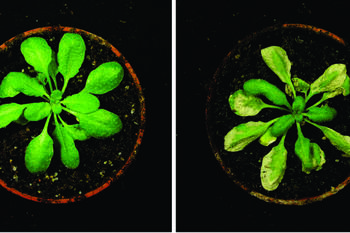When the Biological Clock of Plants Is Disturbed
Biologists at Freie Universität discovered how a hormone affects the circadian clock of plants
Sep 12, 2016
When the light-dark rhythm of plants is disturbed, a defect of the circadian clock or too little of the plant hormone cytokinin causes cell death in the model plant Arabidopsis (thale cress). At left, a non-stressed plant; at right, a stressed plant.
Image Credit: Silvia Nitschke / Freie Universität Berlin
Plants coordinate their physiological and developmental processes over the course of the day. Scientists at the Dahlem Center of Plant Sciences (DCPS), Freie Universität, recently discovered a new form of stress in plants that they have named circadian stress. Their findings indicate that it is caused by a change in the day-night rhythm. The plant hormone cytokinin plays an important role in protecting the plants against this stress.
Plants stay in the same location their entire lives; they cannot run away. They are exposed to various environmental influences where they grow. Daily and seasonal changes in temperature and light conditions, as well as attacks by pests are constantly in the background and are potential stress factors. In recent years many mechanisms by which plants defend themselves against these influences to secure their survival have been explored, but a new type of stress is only very rarely discovered.
Chance Discovery
Sometimes chance plays a role. During repair work on plant growth chambers, scientists working in Applied Genetics at the Institute of Biology, noticed that plants behaved unusually in these chambers. When the light-dark cycle was changed, some plants responded with the death of their leaves – a symptom of extreme stress. A closer examination of these plants led to the discovery of a form of stress previously unknown in plants, which the scientists called "circadian stress" from the Latin term circadian ("around the day," or daily rhythm). The findings were published in Plant Cell, the leading journal of plant sciences.
Influence of the Biological Clock
This stress affects the functioning of the biological, or circadian, clock of plants. The circadian clock is readjusted each day by rhythmic changes in the environment. The most important factors are daily changes in light and temperature. Just as a mechanical clock is made of many cogs and springs, the circadian clock consists of many individual components. These include several genes, including so-called transcription factors, which are necessary for them to function correctly. The transcription factors control when certain genes are transcribed and translated into proteins. For example, in the morning the transcription factors CCA1 and LHY suppress the translation of genes required for processes at night.
Role of Hormone Cytokinin
Once the circadian clock of plants is set correctly, it optimally coordinates various processes according to the time of day. Among other things, it influences the plant hormones that control the growth and development of plants. These hormones also include cytokinin, which plays an important role in cell division and cell differentiation in the roots and shoot tips.
Working in the group led by Professor Thomas Schmülling at the Dahlem Centre of Plant Sciences, in research completed for her doctoral thesis, Silvia Nitschke investigated the relationship between cytokinin and the circadian clock. Nitschke was supported in her work by postdoctoral researcher Anne Cortleven as well as colleagues at Georg-August-Universität in Göttingen and Aix-Marseille Université in France. The work was sponsored by the German Research Foundation (DFG) within the Collaborative Research Center “Priming and Memory of Organismic Responses to Stress.”
Nitschke analyzed the dramatic impact of a heavily modified light-dark cycle in plants with cytokinin deficiency and found that they responded with strong stress symptoms. Leaves of these plants got necrotic spots, and the plants eventually died from them. In plants with normal cytokinin values, however, the experimental conditions had no distinct influence. The scientists concluded that cytokinin is therefore necessary in order for plants to be able to respond appropriately to a changing light-dark cycle.
How the Circadian Clock Runs Smoothly Even under Stress
During a closer examination of the consequences of circadian stress, the biologists recognized that the genes CCA1 and LHY are hardly active in plants with cytokinin deficiency during circadian stress. Consequently, the functioning of the biological clock is severely limited. In control plants with normal cytokinin levels, the biological clock functioned almost undeterred even with circadian stress. Plants with cytokinin deficiency were apparently unable to buffer the impact of the changed light-dark rhythm on the circadian clock. The scientists were able to show that cytokinin normally suppresses the synthesis of a second hormone, jasmonic acid, during circadian stress. If this ability is lost, the second hormone gives the signal for cell death in the affected leaves.
Although the conditions used in the laboratory do not occur in the same form in nature, the researchers were able to draw important conclusions from their experiments. They were able to show that cytokinin is an important component in the machinery of the circadian clock. The researchers surmise that this hormone helps maintain the function of the internal timer, especially under stress conditions. This ensures that processes that are controlled by the biological clock run optimally, even under stress.
The Publication
Silvia Nitschke, Anne Cortleven, Tim Iven, Ivo Feussner, Michel Havaux, Michael Riefler, and Thomas Schmülling (2016): "Circadian Stress Regimes Affect the Circadian Clock and Cause Jasmonic Acid-Dependent Cell Death in Cytokinin-Deficient Arabidopsis Plants," in: The Plant Cell, URL: www.plantcell.org/content/28/7/1616. DOI: http://dx.doi.org/10.1105/tpc.16.00016
Further Information
- Prof. Dr. Thomas Schmülling, Institute of Biology / Applied Genetics, Freie Universität Berlin, Tel.: +49 30 838-55808, Email: tschmue@zedat.fu-berlin.de
- Dr. Kathleen Dahncke, Project Coordinator, Dahlem Centre of Plant Sciences, Freie Universität Berlin, Tel.: +49 30 838-56214, Email: dcps@fu-berlin.de

